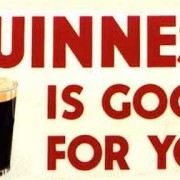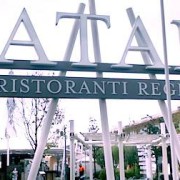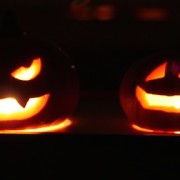What estate?
 In England, the word estate is probably most often used to refer to a housing development. It’s especially associated with ‘council estates’ of public housing. Equivalent terms in use elsewhere include housing scheme (Scotland) and housing project (North America). Unfortunately, such estates are linked in many people’s minds with higher crime rates.
In England, the word estate is probably most often used to refer to a housing development. It’s especially associated with ‘council estates’ of public housing. Equivalent terms in use elsewhere include housing scheme (Scotland) and housing project (North America). Unfortunately, such estates are linked in many people’s minds with higher crime rates.
Recently a Facebook friend of mine who lives in the London area had his motor scooter stolen; he subsequently posted this announcement:
 I confess that my first thought was of an abandoned bike on a council estate. But then I remembered that my friend’s first language is Spanish. Spanish doesn’t allow words to begin with /s/ plus a stop consonant, preventing this by adding an initial /e/. So for Spain, student and scandal, Spanish has España, estudiante and escándalo. At that point I realized that my friend wasn’t referring to the bike’s location, but rather to its condition – its state.
I confess that my first thought was of an abandoned bike on a council estate. But then I remembered that my friend’s first language is Spanish. Spanish doesn’t allow words to begin with /s/ plus a stop consonant, preventing this by adding an initial /e/. So for Spain, student and scandal, Spanish has España, estudiante and escándalo. At that point I realized that my friend wasn’t referring to the bike’s location, but rather to its condition – its state.
It’s particularly tricky for speakers of Spanish (and other languages) to pronounce s + stop clusters when another consonant precedes. If this includes you, you should practise the difference between what estate
and what state:
Make sure you link the words what and state, so the /s/ is pronounced as if it were on the end of the first word, like watts. Here it is again, very slowly:
Further notes
Some readers may be more familiar with the older term country estate (eg the fictional Downton Abbey). It’s possible that the modern use of the word estate was carried over from the country estates on which some housing developments were built.
Another modern British use of the word estate is for a car with an extended roof at the rear, equivalent to station wagon elsewhere.
Myrrh-seyside
 The word myrrh has an obscure spelling and a fairly obscure meaning, but most native English speakers know how to pronounce it. It surfaces annually in the Christmas story, as one of the three gifts brought to the baby Jesus by wise men from afar: gold, frankincense and myrrh. (It’s an aromatic resin.)
The word myrrh has an obscure spelling and a fairly obscure meaning, but most native English speakers know how to pronounce it. It surfaces annually in the Christmas story, as one of the three gifts brought to the baby Jesus by wise men from afar: gold, frankincense and myrrh. (It’s an aromatic resin.)
Myrrh rhymes with stir, blur and prefer. These words contain the NURSE vowel, which in American English is r-coloured
but in BrE is a long schwa sound:
Many young schoolchildren in Britain and other countries learn the words frankincense and myrrh through nativity plays, which act out the Christmas story for audiences of parents. There’s an amusing anecdote about a school nativity play in one of the most popular TED Talks, by British educationalist Sir Ken Robinson. The anecdote begins at 4:20:
If you listen, you’ll hear that Sir Ken pronounces myrrh like mare, a female horse.
In other words he uses not the NURSE vowel əː but the SQUARE vowel ɛː. The likely explanation for this is that he’s from Liverpool, Merseyside. People in that region tend to have a single merged vowel in both NURSE and SQUARE words. This single vowel is variable, but ɛː is certainly a common pronunciation. And, although Sir Ken doesn’t have a strong Merseyside accent, he’s evidently learned the word myrrh with this vowel.
The first vowel in Merseyside is also the NURSE vowel in standard accents, but tends to be pronounced with the merged NURSE-SQUARE ɛː in the broad accent of the region.
Further notes
There’s a nice explanation of the spelling of myrrh in this post on John Wells’s blog. (Basically, the h indicates voiceless r in Ancient Greek.)
The most familiar dictionary symbols for the BrE NURSE and SQUARE vowels are in my opinion both rather misleading. /ɜː/ for NURSE implies a bigger difference in quality from schwa than really exists. /eə/ for SQUARE implies a diphthong, but a pure long vowel is now more common. So I prefer Oxford Dictionaries’ /əː/ and /ɛː/ respectively. Similarly, for the AmE NURSE vowel I prefer the /ɚ/ of the Merriam Webster Learner’s Dictionary.
Good for you!
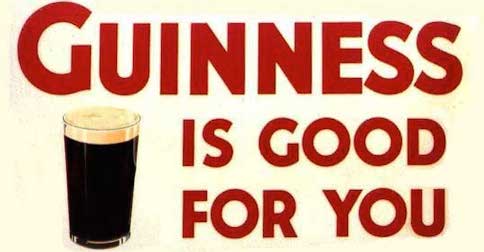 Good for you is a phrase that sometimes confuses non-native English users. In fact it has two meanings, and each has its own pronunciation.
Good for you is a phrase that sometimes confuses non-native English users. In fact it has two meanings, and each has its own pronunciation.
The more obvious meaning is equivalent to ‘beneficial for you’. It appears constantly in the news media, because the public has an insatiable desire to know whether foods or lifestyle choices are healthy or unhealthy. (Guinness famously used to advertise itself with the slogan ‘Guinness is good for you’.) In this usage, the main intonation accent is where we’d expect it to be, according to the rules of the language: on the last ‘content word’, the adjective good, and not on for or you, which are function words (a preposition and a pronoun, respectively). So we get GOOD for you. The word for may or may not have a weakened vowel, but the intonation accent is on good:
The other use of the phrase is as an interjection, an expression recognizing either an achievement or good luck. In social media, it’s often used as a comment responding to someone’s good news. Here’s an example from the past week:
@GMA Tell him I said GOOD FOR YOU!!!
— LillyKate (@LillyKate0) December 9, 2015
When pronounced in this usage, there’s still a stress on good, but the main intonation accent is on you – good for YOU:
In both meanings, you can be replaced by someone else, but the pronunciation difference is maintained. For example, More exercise will be GOOD for them, or She’s done well, good for HER.
Further notes
As Andy Faulkner rightly points out in social media, a strong intonation accent may be placed on you in the ‘beneficial’ meaning, for purposes of contrast. Eg It may not be good for YOU, but it’s certainly good for ME.
Arabic, arabica
 A word which even proficient non-natives often get wrong is Arabic. They’re tempted to stress it on the middle syllable, aRAbic:
A word which even proficient non-natives often get wrong is Arabic. They’re tempted to stress it on the middle syllable, aRAbic:
whereas the correct native pronunciation is stressed on the first syllable, Arabic /ˈarəbɪk/:
The mistake is understandable. It shows awareness that English words ending in -ic are generally stressed on the immediately preceding syllable. There are hundreds of examples, like aerobic, organic, Islamic, dramatic, Pacific, Atlantic, romantic, syllabic, historic, fantastic, athletic, strategic, authentic, metallic…
Arabic is one of only a handful of exceptions with initial stress. The commoner ones are rhetoric, lunatic, politic, turmeric and heretic, plus a few names like Dominic and Ludovic. Note that these are mainly nouns, whereas in general -ic is an ending which creates adjectives: organ > organic, romance > romantic, history > historic, etc. Arabic is basically a noun referring to the language. The general adjective relating to Arabs is Arab, as in Arab world, Arab culture, etc.
The word arabica, on the other hand, is aRAbica /əˈrabɪkə/:
This is entirely consistent with the pattern that puts stress immediately before -ica. So we also get America, Antarctica, harmonica, Metallica, erotica, sciatica, basilica. Arabica is from coffea arabica, the Latin name of the Ethiopian coffee-producing plant.
Eataly
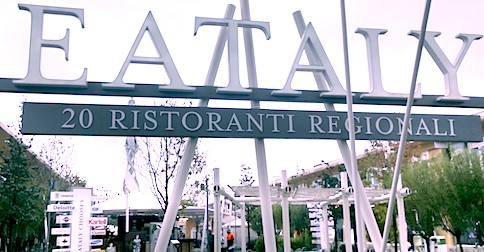 On my recent trip to Italy I encountered for the first time the restaurant and retail brand Eataly. It hasn’t come to Britain yet, though there are branches in the US and Japan.
On my recent trip to Italy I encountered for the first time the restaurant and retail brand Eataly. It hasn’t come to Britain yet, though there are branches in the US and Japan.
This is a ‘portmanteau’ word, like infotainment or Oxbridge. Given the justified fame and popularity of Italian food, it’s instantly communicative. The name was cooked up and registered as a domain name and trademark back in 2000, by savvy Italian brand strategy consultant Celestino Ciocca. Some years later he sold it to the entrepreneur behind Eataly.
In terms of pronunciation, there’s an extra level of fun to this blend of words. Italy begins with the short-lax KIT vowel /ɪ/. Eat on the other hand begins with the long-tense FLEECE vowel, /iː/ (often pronounced as a diphthong, ɪi or ɪj).
The contrast between these two vowels differentiates many words of English, eg it and eat, fill and feel, rich and reach. But it’s a major challenge for many learners, because so many languages lack a contrast of this type and have only a single corresponding i vowel. Italian is one such language. When speakers of such languages say English KIT words with their i, it often sounds to native ears like FLEECE. This means that when Italians say Italy, it can sound to English speakers like ‘Eataly’.
I don’t know whether Celestino Ciocca had this feature in mind in the first place. A ‘brand strategy consultant’ is presumably more sensitive to linguistic nuances than many, but Mr Ciocca’s English-language webpage on Eataly is decidedly non-native. It starts with an odd use of the perfective, makes strange use of words like differentiating and trivial, trips over the do/make distinction, etc.
I’ve sold to Mr. Farinetti the perfect name to promote Italian Food worlwide and I’ve created the differentiating “memorable experiences” to be offered to customers besides trivial “excellent products”.
These are the main contributions I’ve done to this great project.
Personally I rather like the idea that the phonetic pun was unintentional. Either way, Mr Ciocca must be laughing all the way to the bank.
Iron and environment
This month the words iron and environment have been tragically juxtaposed by the collapse of a dam at an iron ore mine in Brazil. The deluge of toxic mud flooded the Doce River, killing at least a dozen people, destroying a village and contaminating the water supply to 200 towns, and has now travelled the 500 km to the Atlantic. It’s said to be Brazil’s greatest environmental disaster.
Environment is generally pronounced as the spelling suggests, bearing in mind that the i is pronounced like the personal pronoun I, as in lion and diamond. The r is definitely pronounced:
As transcribed in the Merriam-Webster Learners Dictionary: /ɪnˈvaɪrənmənt/
The word iron is more unusual, with a more complicated pronunciation history. At some point, I guess before the mid eighteenth century, the o weakened or was lost, giving the kind of pronunciation suggested by the spelling of the Scottish soft drink Irn Bru. A weak ə was inserted before the r, giving ˈajərn or ˈaiərn. In America, ər fused into an r-coloured vowel: as transcribed by the Merriam Webster Learners Dictionary, /ˈajɚn/:
A weak ə was inserted before the r, giving ˈajərn or ˈaiərn. In America, ər fused into an r-coloured vowel: as transcribed by the Merriam Webster Learners Dictionary, /ˈajɚn/:
Around the late eighteenth century, speakers in England stopped pronouncing r except before a vowel. This meant that ˈajərn became ˈajən, which is the contemporary BrE pronunciation:
Many dictionaries write this with ɪ instead of j, /ˈaɪən/.
Tricolor
 The word tricolor, meaning three-coloured, is often used for various republican flags, such as those of Ireland and Italy. It’s perhaps most notably associated, certainly at the moment, with France.
The word tricolor, meaning three-coloured, is often used for various republican flags, such as those of Ireland and Italy. It’s perhaps most notably associated, certainly at the moment, with France.
The word’s spelling and pronunciation in English are variable, and subject to some confusion. The noun colour is written with u in Britain and without u, as color, in the US. In French, this noun is couleur. But tricolor is historically an adjective. The French name for the flag is Le Tricolore, ‘the three-coloured’; compare for example French multicolore meaning ‘multicoloured’. So even in Britain the spelling tricolor is a valid alternative to tricolour with u.
Americans generally pronounce tricolor like the noun color, with tri- pronounced like try as in triangle:
In Britain, on the other hand, the prefix has the vowel of trick, and the middle syllable is weak, as in trilogy:
(Merriam-Webster Learner’s Dictionary: /ˈtraɪˌkʌlɚ/, Brit /ˈtrɪkələ/)
I’ve heard one or two British journalists trying to make the word sound more French by pronouncing the ending as if it were -eur, with a long vowel /əː/. But as we’ve seen, that’s incorrect.
What’d you miss?
 This week I came across a show on Bloomberg television whose written title I misinterpreted. The show is What’d You Miss? What might the contraction ’d stand for?
This week I came across a show on Bloomberg television whose written title I misinterpreted. The show is What’d You Miss? What might the contraction ’d stand for?
In a previous Words of the Week post, I listed contractions common in native spoken English, including ’d as a contraction of either had or would, eg
I’d already done it (had)
I’d go if I were you (would)
I took the ’d in What’d You Miss? to stand for would. I guessed that the show posed the question what would you miss if some circumstance were true – eg what would you miss from home if you emigrated?
I guessed wrong. It turns out that the show begins at the daily closing bell of the New York Stock Exchange, and discusses the investment opportunities of the day just finished. The title means What did you miss?
This contraction of did is indeed possible, though it’s more informal in style; and this is why I didn’t list it in the earlier post. But there’s an interesting further aspect to the pronunciation. When ’d stands for had or would, it’s generally pronounced /əd/ after /t/ and /d/, with an inserted vowel, eg:
It’d already finished (had)
That’d be good (would)
What’d you miss? (would)
But when ’d stands for did, it may be pronounced not as /əd/ but as a simple /d/ attached to the start of the next word. So What’d you miss? can sound the same as What d’you miss? from What do you miss? (also rather informal). And this is the way the show’s presenters say it:
Personally, I’d prefer to write such a pronunciation as What d’you miss? rather than What’d you miss?, as it’s closer to the pronunciation. During my years as a professional writer of screen dialogue I would probably have used the former. But perhaps the latter spelling is more established in America. Of course, since these contractions are informal, they’re not written that much at all.
Further notes
The second of the TV hosts in the clip above turns d’y into /dʒ/, by a process which phoneticians call ‘yod coalescence’. This shows that the residual form of did is attached to the start of you, and not to the end of what.
Mapplethorpe
Robert Mapplethorpe – 175 Artworks, Bio & Shows on Artsy
Browse the best of Robert Mapplethorpe, including artwork for sale, his latest shows & events, biography, and exclusive Robert Mapplethorpe articles.
This Wednesday is the birthday of late American photographer Robert Mapplethorpe, who would have been 69. Aside from his controversial photographs, he’s of phonetic interest because his name breaks a useful spelling pronunciation rule.
Mapplethorpe is pronounced as if its first part were maple, containing the long/tense vowel of may, make and main.
This is bizarre, because of the double p in the spelling. When an English word is written with a double stop consonant (pp, bb, mm, tt, dd, nn, gg), a preceding single vowel letter is pronounced short/lax, and not long/tense. Here are examples containing a, e, i, o, u, with transcriptions from Oxford Dictionaries:
apple /ˈap(ə)l/
beggar /ˈbɛgə/
Twitter /ˈtwɪtə/
comment /ˈkɒmɛnt/
rubbish /ˈrʌbɪʃ/, pudding /ˈpʊdɪŋ/
So Mapple- should rhyme with apple, but instead it sounds exactly like maple /ˈmeɪp(ə)l/. This feature of Mapplethorpe’s spelling is striking enough to cause puzzlement among native speakers. Here’s an extract from The Independent newspaper’s review of a 2011 exhibition:
The only hint of controversy at Wednesday’s private view was over how to pronounce Mapplethorpe’s name. Two men engaged in heated debate as they scaled the Hayward ramp beneath a line of the artist’s portraits. “It’s May-pul-thorpe.” “If it’s May-pul-thorpe, how come it’s got two Ps?”
Further notes
Some borrowed words and foreign names are (or may be) pronounced with long/tense vowels despite being written with a following double stop consonant, eg latte, pitta, prosciutto, Goebbels, Sinitta.
Double consonant letters should not themselves be pronounced long in English (as they are for example in Italian and Finnish). There’s no length contrast in the English consonant system.
Jack o’lantern
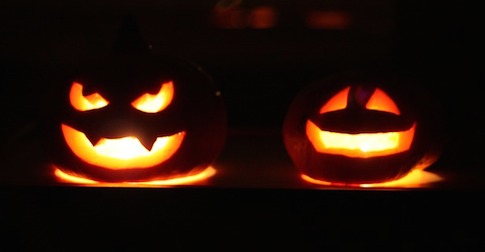 Halloween is almost upon us and already carved pumpkins are widely on display. It’s a tradition with a long history, but not without change. In my childhood we carved spooky faces not into pumpkins but into turnips; before I first went to the USA I don’t think I’d even seen pumpkins, which are native to North America. But nowadays the more spectacular American version has taken over in the UK.
Halloween is almost upon us and already carved pumpkins are widely on display. It’s a tradition with a long history, but not without change. In my childhood we carved spooky faces not into pumpkins but into turnips; before I first went to the USA I don’t think I’d even seen pumpkins, which are native to North America. But nowadays the more spectacular American version has taken over in the UK.
Another change seems to be the decreasing use of the traditional term jack o’lantern for these objects. (The more literal terms ‘Halloween pumpkin’ or ‘carved pumpkin’ seem more common.) The o’ in jack o’lantern is pronounced with the weak, colourless little vowel schwa /ə/, giving /dʒakəˈlantən/:
The o’ comes historically from of the, as in o’clock: originally these were of the lantern and of the clock. Shakespeare’s character Falstaff says
My lord, I was born about three of the clock in the afternoon (Henry IV Part 2)
It’s not surprising that of the dwindled to /ə/ over time – we can hear the same process today as a rapid speech effect. Of the is regularly pronounced weakly, as in President /əv ðə/ United States:
The /v/ can easily be lost, producing /ə ðə/:
And in very rapid speech, the weak consonant /ð/ can be lost and the vowels merged into one:
There, as in jack o’lantern and three o’clock, the only thing between President and United States is a little schwa.
Further notes
Jack of the lantern was historically reanalyzed as an indivisible unit, giving plural jack o’lanterns (not jacks o’lantern). In last week’s post I discussed how some English speakers, including a number of non-natives, have reanalyzed point of view in the same way, giving plural point of views rather than points of view.
The of in point of view is generally /əv/ at normal tempo, /ə/ in rapid speech.



